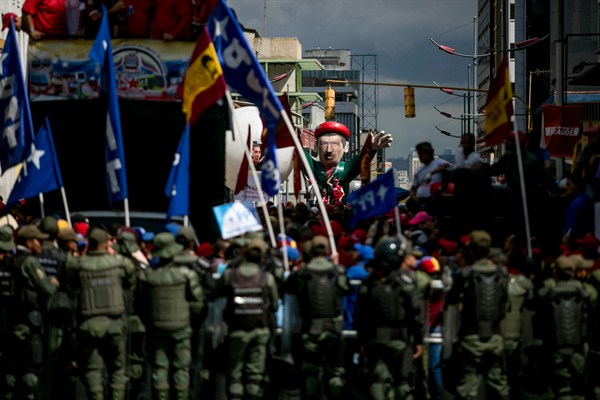Has Venezuela reached its boiling point? The country’s economic, political and humanitarian crises have deepened since the opposition took control of the legislature last December. Venezuelans have taken to the streets with increasing fervor, demanding the resignation of President Nicolas Maduro, who has in turn taken unilateral measures to consolidate his power. Hostility has intensified between the president and the opposition, and the embattled government’s actions have only exacerbated tensions and done little to address popular frustration. World Politics Review has compiled 10 articles that chronicle Venezuela’s slide toward the abyss.
Short Supply: Can Venezuela Survive Chavismo?
In the run-up to last December’s general elections, Peter Wilson reported from Caracas on the political storm clouds gathering in Venezuela. At the time, the opposition was gaining momentum as the economic situation worsened, and it became increasingly clear that Maduro’s United Socialist Party of Venezuela, or PSUV, would lose big. Wilson’s piece helps to contextualize the decline of Chavismo—the left-wing ideology associated with deceased former President Hugo Chavez—and outlines the conditions that facilitated the current crisis.
After a crushing defeat in the December legislative elections, Maduro continued to act as if he and the PSUV had received the people’s blessing to expand his party’s platform unabated. Peter Wilson pointed out that, by ignoring that the opposition had actually won a super-majority in the National Assembly, Maduro was foreshadowing an imminent political showdown. Against that backdrop, the ongoing feud between Maduro and the opposition should come as no surprise.
Immediately after the opposition was formally sworn into congress in January, Frida Ghitis argued that the “shambolic” event, marked by competing street protests and political battles, offered a glimpse into the chaotic months that would follow. “Both sides have already raised the stakes, and both have shown they are prepared for a fight,” she wrote.
As an escalating standoff between Maduro and the opposition continued into March, it became clear that political paralysis would prevent any action on Venezuela’s rapidly deteriorating economic situation. Reporting from Caracas, Peter Wilson documented a shift in the opposition’s strategy: For the first time since taking control of congress, the opposition called for mass protests to demand that Maduro peacefully step down. At the time, many feared that mounting unrest could draw in the military.
In April, David Smilde assessed Venezuela’s crisis in the context of the recent unraveling of leftist ideology in Latin America, marked by then-Brazilian President Dilma Rousseff’s ongoing impeachment saga; the end of more than a decade of Kirchnerism in Argentina; and a fading left in Ecuador and Bolivia. Rather than adapt to the changing landscape, Smilde wrote, Maduro chose to double down on virulent rhetoric and paranoid accusations against outside forces.
Headed Toward the Brink
In May, following months of failed legislation due to roadblocks implemented by Maduro’s party, Venezuela’s opposition dramatically raised the stakes by delivering nearly 2 million signatures to electoral authorities in support of a recall referendum for Maduro. As Frida Ghitis wrote, the country’s backdrop of despair, with shortages of money, food and electricity, all but made the case for the recall effort. The possibility of a referendum offered hope for a way out, but a series of hurdles sealed the opposition’s fate: Election officials ultimately blocked a referendum in October.
In June, the Permanent Council of the Organization of American States (OAS) held a meeting to discuss Venezuela’s slide toward instability. But the effort, belatedly launched by the democratically elected governments of the OAS, might have been too little, too late. As Amy Williams asked at the time, how and why did the OAS stand by for so long, passively watching Venezuela’s downward spiral?
By July, Venezuela’s turbulence at home had grown into a regional concern. Caracas, particularly under Chavez, had played a crucial role in the Colombian government’s negotiation of a peace deal with the Revolutionary Armed Forces of Colombia (FARC) guerilla group, prompting David Smilde and Dimitris Pantoulas to ask whether an impending Venezuelan meltdown could upend that delicate peace process. Whatever the political outcome in Venezuela, they wrote, Colombia must face the fact that its neighbor will likely remain in crisis for the next couple of years.
It has become increasingly clear that Venezuela’s profound political and economic crisis is not confined to its borders, Michael Shifter and Bruno Binetti wrote in September. Nowhere is that spillover clearer than in Mercosur, the Common Market of the South, an economic integration mechanism founded in 1991 by Brazil, Argentina, Uruguay and Paraguay, which Venezuela joined in 2012. A heated debate over Venezuela’s fitness to lead the trade bloc—the country was next in line to head the group—sent Mercosur into the worst internal turmoil of its history.
Last week, the PSUV-controlled electoral authorities ordered an end to the movement to bring about a recall referendum, infuriating the opposition. The move, Frida Ghitis argued, was the latest in the country’s slide toward the abyss, and prompted thousands of protesters to once again take to the streets. With Venezuela’s neighbors eying the crisis with increasing concern, Maduro finally agreed to hold talks with the opposition. But there’s faint hope that, if they happen, the talks will produce results.
Related

